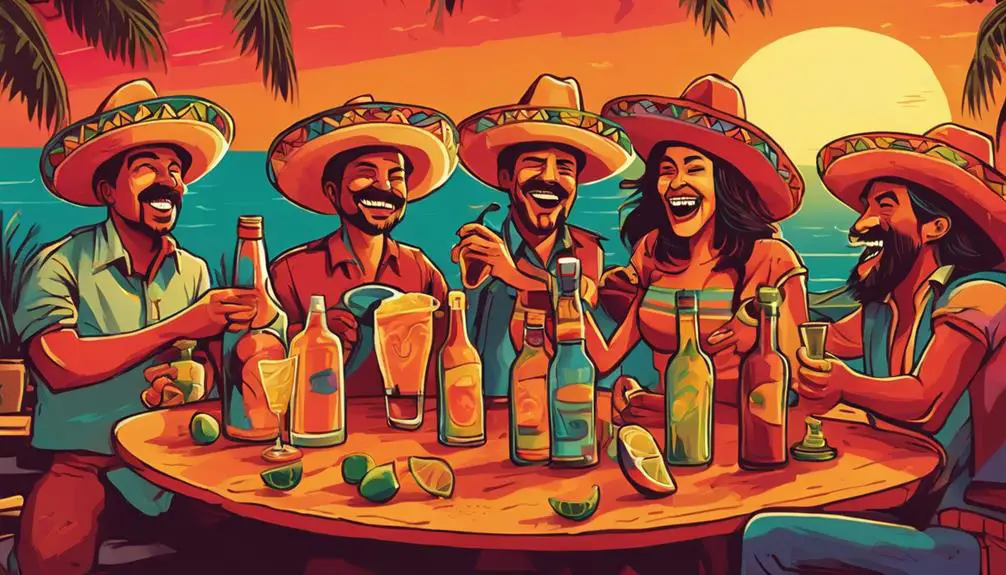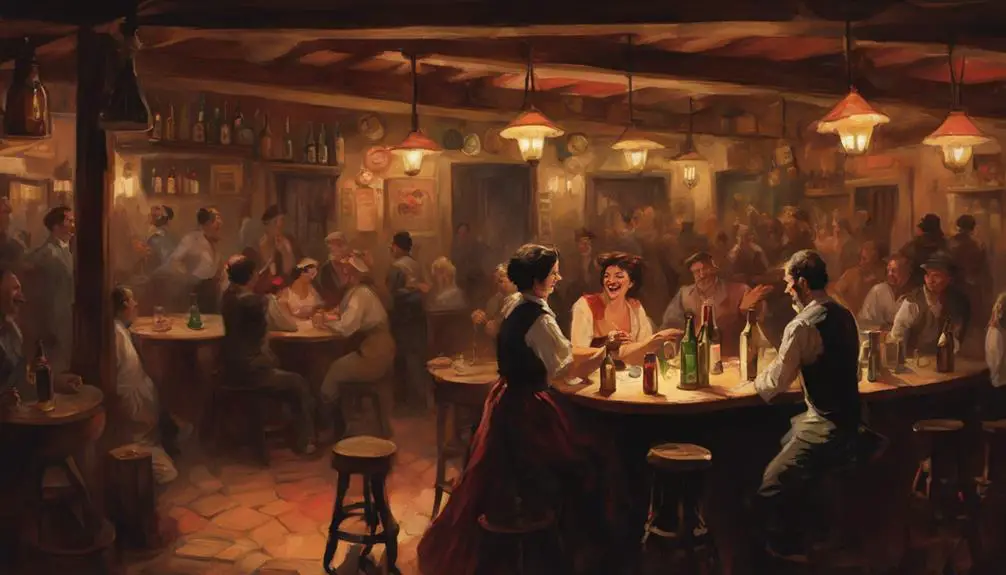When you're partying in Spain, knowing how to say you're drunk in Spanish can be a lifesaver. You can say 'Estoy borracho/a' to mean 'I'm drunk', 'Estoy pedo/a' for 'I'm wasted', or 'Estoy como una cuba' to mean 'I'm like a barrel'. If you're feeling a little drunk, say 'Estoy piripi'. Be mindful of drinking limits and drink responsibly. Keep in mind that public intoxication can lead to fines or arrest. Want to navigate the Spanish party scene like a pro?
Getting Your Drink On

When you're ready to get your drink on, you'll want to know the Spanish slang for 'drunk', especially in social situations where a few too many cervezas can quickly add up. Whether you're bar hopping or taking advantage of Happy Hour deals, it's crucial to know how to communicate with locals and fellow partygoers.
In Spain, you might hear people saying 'estoy borracho/a' (I'm drunk) or 'estoy pedo/a' (I'm wasted). If you're feeling a bit more festive, you can say 'estoy como una cuba' (I'm like a barrel, implying you're completely full of drink). If you're not quite there yet, you might say 'estoy tomado/a' (I'm tipsy).
When socializing, it's important to be mindful of your drinking limits and the company you're keeping. Remember, in Spain, the drinking culture is often more relaxed, but it's still crucial to drink responsibly.
Tipsy Terms From Tapas Bars
In tapas bars, you'll often hear patrons ordering a round of drinks and using colloquial expressions to describe their inebriated state. As you soak up the lively atmosphere, you'll pick up on the local lingo that's woven into Tapas traditions.
Wine wisdom is key in Spain, where a glass of vino is always within arm's reach. When you're feeling 'borracho' (drunk), you might exclaim 'Estoy pedo!' (I'm drunk!) or 'Estoy trompa' (I'm smashed!). If you're just feeling tipsy, you might say 'Estoy piripi' (I'm a little drunk). Your friends might tease you, saying 'Estás como una cuba' (You're as drunk as a Cuban!), implying you're really, really drunk.
As the night wears on, you might need to 'irse a dormir' (go to sleep), but not before ordering one last 'chupito' (shot) to cap off the night. So, the next time you're sipping on a cold cerveza in a tapas bar, don't be afraid to throw around some of these phrases and blend in with the locals.
¡Salud!
Drunk and Disorderly Conduct

As you're having the time of your life in a tapas bar, you might not even notice when you've crossed the line from being 'pedo' to being downright disorderly. But beware, because the Spanish authorities take a dim view of drunk and disorderly conduct. If you're causing a public disturbance, you could face legal consequences.
| Behavior | Legal Consequences | Penalties |
|---|---|---|
| Public Intoxication | Fine or Arrest | Up to €600 fine |
| Disorderly Conduct | Arrest and Charges | Up to 1 year imprisonment |
| Resisting Authorities | Charges and Trial | Up to 3 years imprisonment |
| Vandalism | Charges and Trial | Up to 5 years imprisonment |
| Physical Altercation | Charges and Trial | Up to 10 years imprisonment |
Slang for the Seriously Sloshed
Understanding these slang terms is crucial in a tapas bar when someone's had one too many, helping you navigate the scene.
When someone's exhibiting borracho behavior, they're likely to be stumbling around, slurring words, and making a general mess of themselves. You might hear someone say 'está pasado de vueltas' (they're really drunk) or 'está como una cuba' (they're as drunk as a skunk).
If someone's had a few too many and ends up making a fool of themselves, you might hear 'fiesta fail' or 'fracaso de fiesta' to describe the situation.
In Spain, where socializing and drinking go hand-in-hand, understanding how to describe someone who's had a bit too much to drink is crucial.
You might hear 'borrachín' to describe someone who's a bit tipsy or 'pedo' for someone who's completely sloshed. If you're out with friends and someone's getting a bit too rowdy, you might say 'vamos a calmarnos un poco' (let's calm down a bit).
Understanding these slang terms can help you fit in and navigate the Spanish party scene like a pro.
Morning After Regrets

After a night of excessive drinking, you're likely to wake up with a pounding headache and a lingering sense of regret. The morning after is often filled with Regretful Reflections, as you replay the events of the previous night in your mind, wondering what you did and said. This is what the Spanish call the "Post Binge Blues," a feeling of remorse and guilt that comes with overindulging in alcohol.
| Symptom | Description | Spanish Phrase |
|---|---|---|
| Headache | A throbbing pain in your head | _Dolor de cabeza_ |
| Regret | Feeling sorry for your actions | _Arrepentimiento_ |
| Fatigue | Feeling extremely tired | _Cansancio_ |
As you try to piece together the events of the night before, you can't help but think about what you could've done differently. The morning after is a time for reflection, and hopefully, a chance to learn from your mistakes. So, take a deep breath, grab a glass of water, and try to shake off the Post Binge Blues. Tomorrow is a new day, and a chance to start fresh.
Under the Influence Expressions
When you're under the influence, your words and actions can get lost in translation, leading to some hilarious and often regrettable moments that will leave you wondering what possessed you to say or do that.
In Spanish, you'll want to know how to describe your, ahem, 'altered' state. You're 'borracho' (drunk) or 'ebrio' (intoxicated), but if you're just feeling the buzz, you're 'tomado' (tipsy).
If you're hanging out with friends, you're in a 'juerga' (party) and your 'amigos borrachos' (buzzed buddies) are keeping the good times rolling.
When you're indulging in some 'relaxation' at the bar, you're enjoying some 'relax en un bar' (liquid lounging). If you're feeling a bit more adventurous, you might be 'echando un trago' (taking a shot) or 'tomando una cerveza' (having a beer).
Whatever your vice, knowing the right phrases will help you navigate even the most questionable of decisions made under the influence.
Hangover Helper Phrases

Morning comes, and with it, the dreaded hangover symptoms kick in – your head is throbbing, your mouth feels parched, and all you want is to crawl back into bed. But don't let the hangover get the best of you! Here are some Spanish phrases to help you recover and get back on your feet.
| Phrase | English Translation | When to Use |
|---|---|---|
| ¡Toma un café! | Have a coffee! | When you need a morning pick-me-up |
| Necesito un cure all | I need a cure all | When you're desperate for a hangover remedy |
| ¿Dónde está el agua? | Where is the water? | When you're parched and need hydration |
| ¡Vamos a comer algo! | Let's go eat something! | When you need some morning motivators |
These phrases will help you navigate the morning after a night out. Whether you need a caffeine boost, a cure-all for your hangover, or just some water to rehydrate, these phrases will get you back on track. So, take a deep breath, grab a coffee, and remember – mañana es un nuevo día (tomorrow is a new day)!
Frequently Asked Questions
Can I Use Spanish Slang in Formal Drinking Settings?
When attending a formal fiesta, you might wonder if using Spanish slang is appropriate.
While it's tempting to bust out your Wine Wisdom, it's best to stick with formal language. Unless you're with close friends, using slang can come across as unrefined.
Instead, opt for polite phrases like '¿Puedo tener un vaso de vino, por favor?' (Can I've a glass of wine, please?). This will show your Wine Wisdom while maintaining a respectful tone.
Are There Regional Differences in Drunk Slang in Spain?
As you explore regional differences in Spain, you'll find varying slang for being drunk. In the south, the Andalusian dialect uses terms like 'borracho' or 'chapa'o.'
Meanwhile, in Catalonia, you'll hear Catalan variations like 'begut' or 'pixat.' These regional nuances reflect local cultures and dialects.
When communicating with locals, using their preferred slang will help you better connect and show respect for their heritage.
Can I Use These Phrases in Other Spanish-Speaking Countries?
Learning local phrases is crucial when traveling to other Spanish-speaking countries. Cultural nuances and language barriers can make it challenging to use Spanish slang in different regions, so it's important to be mindful.
What's acceptable in Spain mightn't be in Argentina or Mexico, so familiarizing yourself with local expressions can help prevent confusion or offense and facilitate a smoother cultural exchange.
Are There Any Common Mistakes to Avoid When Using Drunk Slang?
When using colloquial expressions, you'll want to avoid common mistakes that can lead to miscommunication.
Be mindful of mispronunciation pitfalls, as slight variations in accent or intonation can alter the meaning.
Also, watch out for idiomatic misunderstandings, where phrases don't translate directly. For instance, using 'tomar el pelo' (to take someone's hair) instead of 'tomar el pelo a alguien' (to tease someone) can lead to confusion.
Be aware of these potential pitfalls to guarantee effective communication.
Can I Use Drunk Slang in Writing, Like in Texts or Social Media?
You're tempted to pepper your online presence with slang, but hold up! Using drunk slang in writing, like in texts or social media, can be a tone-deaf move. You risk tone appropriation, coming across as inauthentic or even offensive.
Be mindful of language barriers and cultural sensitivity. Instead, cultivate an online persona that exudes casual vibes through thoughtful language choices. Remember, your online voice should be respectful, not reckless.
Conclusion
As you stumble through the streets of Spain, your Spanish vocabulary dwindles to a mere whisper. But don't worry, you're not alone – even the most seasoned linguists can get lost in translation when the beers start flowing.
Remember, when in doubt, just shout '¡Estoy borracho!' (I'm drunk!) and hope for the best.
Like a sailor clinging to a liferaft, hold on to these phrases and ride out the hangover.







